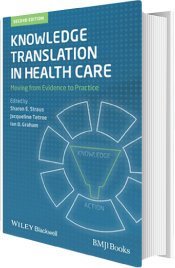Sharon E. Straus, MD, MSc, FRCPC
Jacqueline Tetroe, MA
Ian D. Graham, PhD
Eman Leung, PhD
Download: Presentation (PDF, 171KB)
What is Knowledge Translation:
“Knowledge translation (KT) is defined as a dynamic and iterative process that includes synthesis, dissemination, exchange and ethically-sound application of knowledge to improve the health of Canadians, provide more effective health services and products, and strengthen the health care system.”
Canadian Institutes of Health Research
What Other Terms Have Been Used to Describe Knowledge Translation:
- Implementation Science
- Research Utilization
- Communication
- Diffusion of Innovation
- Continuing Education
- Continuing Professional Development
- Knowledge Management
What Is NOT Knowledge Translation:
- Commercialization (this could be a type of KT activity, but focus is narrow)
- Technology Transfer
- Bench-to-Bedside Transfer
- Translational Research
Why Knowledge Translation is Needed:
- 1/3 of patients do not get treatments of proven effectiveness
- 1/4 of patients get care that is not needed or is potentially harmful
- Up to 3/4 of patients do not get the information they need for decision making
- Up to 1/2 of physicians do not get the evidence they need for decision making
Why Knowledge Translation is Needed:
Examples:
- While statins can decrease the risk of mortality and morbidity in post stroke patients, statins are considerably underprescribed
(LaRosa et al., JAMA 1999; 282 [24]: 2340-6) - Antibiotics are over prescribed in children with upper respiratory tract symptoms
(Arnold & Straus. Cochrane Database Syst Rev 2005 Oct 19; [4]: CD003539)
How Knowledge Translation is Done:
Creating Knowledge
- Deriving knowledge from primary studies, such as randomized controlled trials (Knowledge Inquiry)
- Synthesizing primary studies to form secondary knowledge, such as systematic reviews or meta-analyses
- Generating knowledge tools or products (third-generation knowledge) such as practice guidelines, decision aids or care pathways based on best available evidence distilled from synthesized knowledge
Applying Knowledge
- Identifying the problem, and identifying, reviewing and selecting knowledge
- Adapting knowledge to local context
- Assessing barriers & facilitators to knowledge use
- Selecting, tailoring and implementing intervention to address barriers to knowledge use
- Monitoring knowledge use
- Evaluating outcome of knowledge use
- Developing mechanisms to sustain knowledge use

